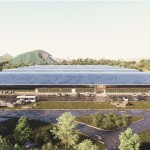Choluteca, Honduras-based ESF Seafood has announced major developments and solar panel installations as part of a three-year sustainability and carbon-reduction development plan.
ESF Seafood has a 11,700-square-meter plant for IQF (individual quick-freeze) value-added shrimp production, with brining and freezing capabilities, and cold storage capable of holding up to five million pounds of product.
Over the duration of its three-year sustainability plan, which the company launched in 2022, ESF plans to replace more than 60 percent of its energy needs with solar power, working toward a goal of being a 100 percent carbon-neutral processer.
In its initial phases, ESF plans to speed up its investments to install solar paneling capable of producing 3.5 megawatts of energy generation. It is currently working to commission the first 1.2 megawatts of generation, which will produce 27 percent of the facility’s energy.
“Certainly, by the middle of 2023, we will be generating 100 percent of our energy requirements from solar panels,” Tome said.
The company said it can quickly execute the solar implementation due to the high "PVOUT index" in Choluteca, which Tome explained is the photovoltaic potential of the solar energy in the area. Southern Honduras produces approximately a 4.8 PVOUT index level, which Tome said was a high score.
“The reason we can move so fast is because of the very high PVOUT in this specific area. These are the kind of differentiating factors; I think that will give us one turn of sustainability in the industry because it’s not easy to do," Tome told SeafoodSource. “Harvesting, processing, and freezing shrimp in a tropical climate requires a very significant amount of energy. Southern Honduras is an ideal location for capturing solar energy due to the area’s high photovoltaic (PVOUT) rating and we are able to utilize our plant’s roof space for the solar panel installation, which reduces the need for additional land usage. A recently approved law for commercial bi-directional meters enhances the profitability of additional energy generation by allowing us to supply surplus back into the national grid during non-peak periods."
ESF Seafood Director Ivan Clements said the company is also prioritizing carbon neutrality and emissions reductions as a part of its sustainability initiative.
“Reducing carbon emissions is a critical objective for our customers worldwide. We will be the first shrimp processing plant to migrate to renewable energy; we will decrease our carbon footprint by over 2,000 tons in 2023 and have a clear plan to achieve carbon neutral status. Taking a leading position in sustainability and energy security will help ensure the ongoing success of our business in Honduras and continue to provide our customers with high-quality, value-added shrimp and our people with good jobs,” Clements said.
Tome said the company plans to extend its sustainability push throughout its supply chain.
"We’re working very closely with the farms and with the hatcheries in terms of presenting really, talking about the sustainability of the industry,” Tome said.
ESF Seafood will begin its commissioning tests for generating its electricity needs soon. When the installation is finished, ESF will be able to substitute close to 30 percent of its energy needs.
“By the end of December 2023, next year, we should be generating 60 to 66 percent of our energy needs. And by the end of 2024, we should be generating 99 percent of our energy needs through our instillations directly,” Tome said. “We’re very excited about it.”
Photo courtesy of ESF Seafood







